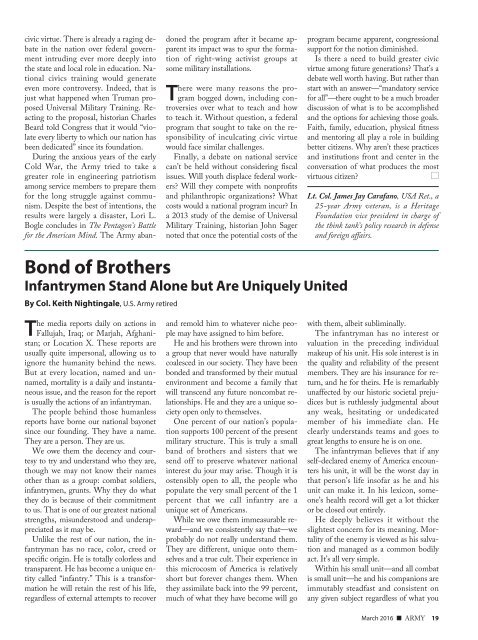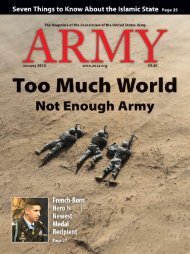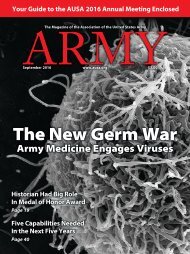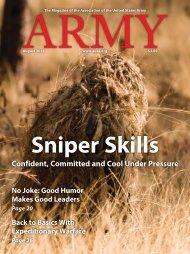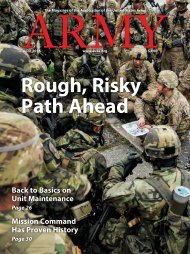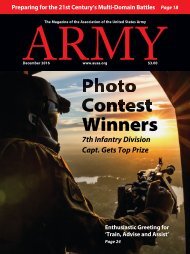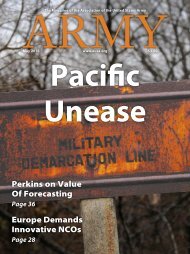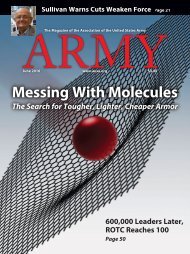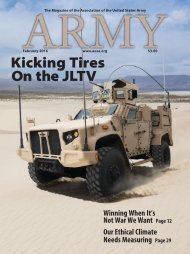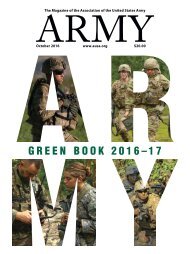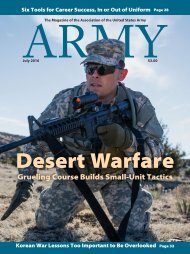Army - Stimulating Simulation
Create successful ePaper yourself
Turn your PDF publications into a flip-book with our unique Google optimized e-Paper software.
civic virtue. There is already a raging debate<br />
in the nation over federal government<br />
intruding ever more deeply into<br />
the state and local role in education. National<br />
civics training would generate<br />
even more controversy. Indeed, that is<br />
just what happened when Truman proposed<br />
Universal Military Training. Reacting<br />
to the proposal, historian Charles<br />
Beard told Congress that it would “violate<br />
every liberty to which our nation has<br />
been dedicated” since its foundation.<br />
During the anxious years of the early<br />
Cold War, the <strong>Army</strong> tried to take a<br />
greater role in engineering patriotism<br />
among service members to prepare them<br />
for the long struggle against communism.<br />
Despite the best of intentions, the<br />
results were largely a disaster, Lori L.<br />
Bogle concludes in The Pentagon’s Battle<br />
for the American Mind. The <strong>Army</strong> abandoned<br />
the program after it became apparent<br />
its impact was to spur the formation<br />
of right-wing activist groups at<br />
some military installations.<br />
There were many reasons the program<br />
bogged down, including controversies<br />
over what to teach and how<br />
to teach it. Without question, a federal<br />
program that sought to take on the responsibility<br />
of inculcating civic virtue<br />
would face similar challenges.<br />
Finally, a debate on national service<br />
can’t be held without considering fiscal<br />
issues. Will youth displace federal workers?<br />
Will they compete with nonprofits<br />
and philanthropic organizations? What<br />
costs would a national program incur? In<br />
a 2013 study of the demise of Universal<br />
Military Training, historian John Sager<br />
noted that once the potential costs of the<br />
program became apparent, congressional<br />
support for the notion diminished.<br />
Is there a need to build greater civic<br />
virtue among future generations? That’s a<br />
debate well worth having. But rather than<br />
start with an answer—“mandatory service<br />
for all”—there ought to be a much broader<br />
discussion of what is to be accomplished<br />
and the options for achieving those goals.<br />
Faith, family, education, physical fitness<br />
and mentoring all play a role in building<br />
better citizens. Why aren’t these practices<br />
and institutions front and center in the<br />
conversation of what produces the most<br />
virtuous citizen?<br />
■<br />
Lt. Col. James Jay Carafano, USA Ret., a<br />
25-year <strong>Army</strong> veteran, is a Heritage<br />
Foundation vice president in charge of<br />
the think tank’s policy research in defense<br />
and foreign affairs.<br />
Bond of Brothers<br />
Infantrymen Stand Alone but Are Uniquely United<br />
By Col. Keith Nightingale, U.S. <strong>Army</strong> retired<br />
The media reports daily on actions in<br />
Fallujah, Iraq; or Marjah, Afghanistan;<br />
or Location X. These reports are<br />
usually quite impersonal, allowing us to<br />
ignore the humanity behind the news.<br />
But at every location, named and unnamed,<br />
mortality is a daily and instantaneous<br />
issue, and the reason for the report<br />
is usually the actions of an infantryman.<br />
The people behind those humanless<br />
reports have borne our national bayonet<br />
since our founding. They have a name.<br />
They are a person. They are us.<br />
We owe them the decency and courtesy<br />
to try and understand who they are,<br />
though we may not know their names<br />
other than as a group: combat soldiers,<br />
infantrymen, grunts. Why they do what<br />
they do is because of their commitment<br />
to us. That is one of our greatest national<br />
strengths, misunderstood and underappreciated<br />
as it may be.<br />
Unlike the rest of our nation, the infantryman<br />
has no race, color, creed or<br />
specific origin. He is totally colorless and<br />
transparent. He has become a unique entity<br />
called “infantry.” This is a transformation<br />
he will retain the rest of his life,<br />
regardless of external attempts to recover<br />
and remold him to whatever niche people<br />
may have assigned to him before.<br />
He and his brothers were thrown into<br />
a group that never would have naturally<br />
coalesced in our society. They have been<br />
bonded and transformed by their mutual<br />
environment and become a family that<br />
will transcend any future noncombat relationships.<br />
He and they are a unique society<br />
open only to themselves.<br />
One percent of our nation’s population<br />
supports 100 percent of the present<br />
military structure. This is truly a small<br />
band of brothers and sisters that we<br />
send off to preserve whatever national<br />
interest du jour may arise. Though it is<br />
ostensibly open to all, the people who<br />
populate the very small percent of the 1<br />
percent that we call infantry are a<br />
unique set of Americans.<br />
While we owe them immeasurable reward—and<br />
we consistently say that—we<br />
probably do not really understand them.<br />
They are different, unique onto themselves<br />
and a true cult. Their experience in<br />
this microcosm of America is relatively<br />
short but forever changes them. When<br />
they assimilate back into the 99 percent,<br />
much of what they have become will go<br />
with them, albeit subliminally.<br />
The infantryman has no interest or<br />
valuation in the preceding individual<br />
makeup of his unit. His sole interest is in<br />
the quality and reliability of the present<br />
members. They are his insurance for return,<br />
and he for theirs. He is remarkably<br />
unaffected by our historic societal prejudices<br />
but is ruthlessly judgmental about<br />
any weak, hesitating or undedicated<br />
member of his immediate clan. He<br />
clearly understands teams and goes to<br />
great lengths to ensure he is on one.<br />
The infantryman believes that if any<br />
self-declared enemy of America encounters<br />
his unit, it will be the worst day in<br />
that person’s life insofar as he and his<br />
unit can make it. In his lexicon, someone’s<br />
health record will get a lot thicker<br />
or be closed out entirely.<br />
He deeply believes it without the<br />
slightest concern for its meaning. Mortality<br />
of the enemy is viewed as his salvation<br />
and managed as a common bodily<br />
act. It’s all very simple.<br />
Within his small unit—and all combat<br />
is small unit—he and his companions are<br />
immutably steadfast and consistent on<br />
any given subject regardless of what you<br />
March 2016 ■ ARMY 19


